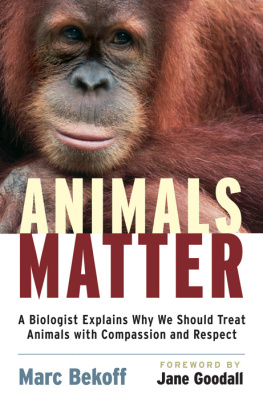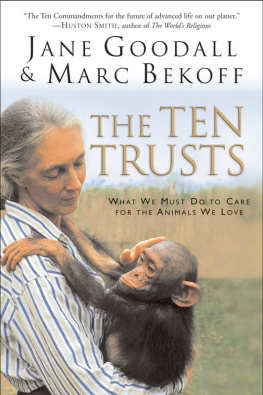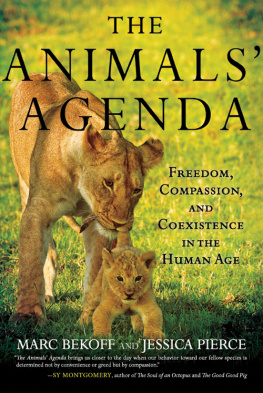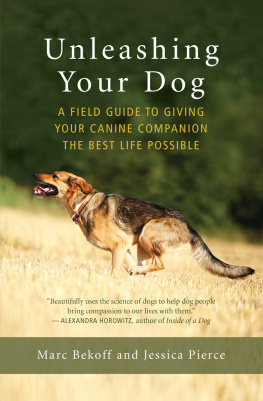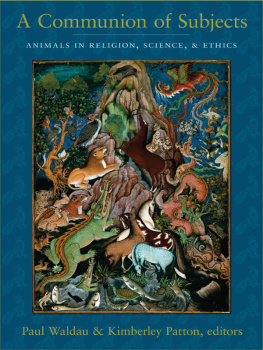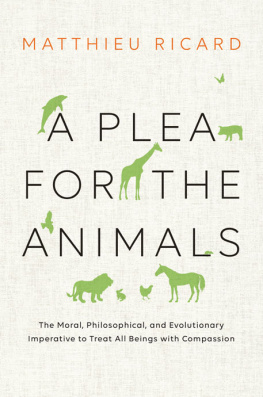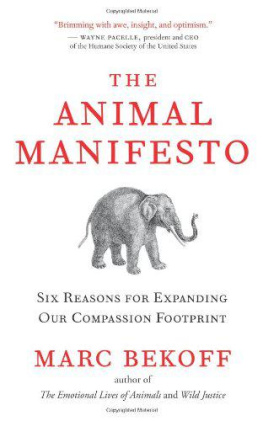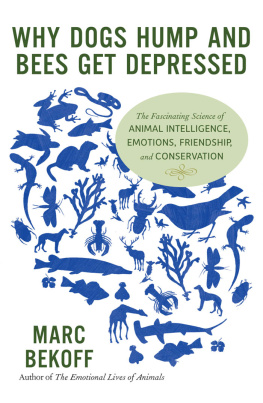People who want to end animal exploitation sometimes are accused of being unscientific and uninformed. Marc Bekoffs Animals Matter is (and for a long time will remain) the gold standard when it comes to offering a scientific, informed response to these reckless charges. As Bekoff demonstrates, a scientifically informed understanding of who animals are supports their liberation from the hands of human tyranny.
Tom Regan, author of The Case for Animal Rights and Empty Cages
Marc Bekoff is the wisest scientist I know, for he is the only expert who truly loves animals in the way that children are able to love animals, with all his heart. Listen to him. Read this book, give it to friends, celebrate this wonderful event.
Jeffrey Moussaieff Masson, author of Altruistic Armadillos, Zenlike Zebras
Its not every day that a world-class scientist tries to explain his ideas to a general audience. Marc Bekoff not only helps us to understand nature and animals, but also shows us how to love them.
Dale Jamieson, author of Ethics and the Environment
ABOUT THE BOOK
Nonhuman animals have many of the same feelings we do. They get hurt, they suffer, they are happy, and they take care of each other. Marc Bekoff, a renowned biologist specializing in animal minds and emotions, guides readers from high school age upincluding older adults who want a basic introduction to the topicin looking at scientific research, philosophical ideas, and humane values that argue for the ethical and compassionate treatment of animals. Citing the latest scientific studies and tackling controversies with conviction, he zeroes in on the important questions, inviting reader participation with thought experiments and ideas for action. Among the questions considered:
- Are some species more valuable or more important than others?
- Do some animals feel pain and suffering and not others?
- Do animals feel emotions?
- Should endangered animals be reintroduced to places where they originally lived?
- Should animals be kept in captivity?
- Are there alternatives to using animals for food, clothing, cosmetic testing, and dissection in the science classroom?
- What can we learn by imagining what it feels like to be a dog or a cat or a mouse or an ant?
- What can we do to make a difference in animals quality of life?
Bekoff urges us not only to understand and protect animalsespecially those whose help we want for our research and other human needsbut to love and respect them as our fellow beings on this planet that we all want to share in peace.
MARC BEKOFF, PhD, a biologist who specializes in cognitive ethology (the study of animal minds) and behavioral ecology, is the author of some twenty books. With Jane Goodall, he cofounded Ethologists for the Ethical Treatment of Animals.
Sign up to learn more about our books and receive special offers from Shambhala Publications.

Or visit us online to sign up at shambhala.com/eshambhala.
ANIMALSMATTER
A Biologist Explains Why We Should Treat Animals with Compassion and Respect
Marc Bekoff
Foreword by Jane Goodall

Shambhala
Boston & London
2012
Shambhala Publications, Inc.
Horticultural Hall
300 Massachusetts Avenue
Boston, Massachusetts 02115
www.shambhala.com
2000, 2007 by Marc Bekoff
All rights reserved. No part of this book may be reproduced in any form or by any means, electronic or mechanical, including photocopying, recording, or by any information storage and retrieval system, without permission in writing from the publisher.
Library of Congress Cataloging-in-Publication Data Bekoff, Marc.
Animals matter: a biologist explains why we should treat animals with compassion and respect / Marc Bekoff; foreword by Jane Goodall.
p. cm.
Includes bibliographical references and index.
eISBN 978-0-8348-2587-1
ISBN 978-1-59030-522-5 (alk. paper)
1. Animal welfare. 2. Animal welfareMoral and ethical aspects. I. Title.
HV4708.B44 2007
179.3dc22
2007012968
For children and young adults everywhere.
May your interactions with our animal kinbe filled with respect, compassion,spirit, humility, and love.
Keep hope alive even when things seem grim.
Dont let go of your dreams.
There are many better tomorrows.
And for my wonderful parentswho allowed me to pursuemy passions with wild abandon.
Contents













by Jane Goodall
W hether an individual respects, ignores, or harms different kinds of animals depends, to a large extent, on the kind of environment in which the child grew up, especially the attitudes of family or friends. I was fortunate: when my mother found Id taken a whole handful of worms to bed with me (I was ten months old), she did not throw them out, but quietly told me they would die without earth, so I toddled with them back into the little bit of garden outside our London apartment. She encouraged my interest in animals. We had a dog and, throughout my childhood, a series of cats and a variety of guinea pigs, hamsters, and so on, which my sister and I were absolutely responsible forbut not allowed to forget. Ever. We were brought up to hate caged thingsour canary and subsequently our budgerigar had cage doors left open and flew freely. Our rabbits had the run of the house, the hamster nested in the back of the sofa, and our guinea pigs were regularly taken from their runs and walked, on harnesses, around the streets.
Also, we were encouraged both to explore and interact with the natural world, and to learn about it from the books with which my childhood was surrounded. The most precious of these was a large volume, The Miracle of Life, which had been delivered free as a reward for collecting an astronomical number of coupons from packets of some kind of foodcereal probably. That book, with its myriad of illustrations, dealt with topics as diverse as many tongues for many purposes and the history of medicine. It was written for adults but it was my passion and helped to shape my respect for life and wonder in nature.
Since those far-off days, before the Second World War, much has changed in the world. There always was abuse of animals, but we are more aware of it today, thanks to the media and the tireless efforts of those who seek to protect creatures of all sorts, from lobsters to chimpanzees, and the environments in which they live. The horror of factory farming is new. The extraordinary explosions of human populations worldwide has caused an ever-increasing hostility between man and beast as they compete for dwindling resourcesand the natural world is losing out. The grim inner-city areas and the poverty that exists even in the most affluent countries increasingly alienate children from nature.
Next page
